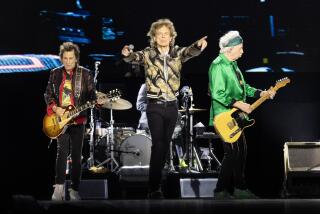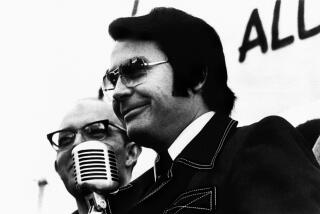Rock: Shaking the Pews, but Also a Spirit Unto Itself
Satan can’t pick sides in the rock-and-religion debate anymore. When Saturday night turns into Sunday morning, the drums and electric guitars put down in smoky nightclubs can be heard again in the sanctuaries of many churches.
Once bitter enemies, each side in the struggle for young adult souls is turning its philosophical swords into plowshares of appreciation. While the rock world commemorates the spiritual roots of many of its greatest stars, more churches are embracing popular music as a way to reach a substantially unchurched generation.
U2 and Creed are two of the biggest breakthrough groups bridging the gap between spirituality and rock culture, says Jim Henke, chief curator of the Rock and Roll Hall of Fame and Museum in Cleveland. “A lot of the best rock ‘n’ roll has always been the search for truth, the search for meaning.”
In a paper delivered this spring at a Society for the Anthropology of Religion conference in Cleveland, Laura Helper talked about the evolving relationship between the rock of ages and rock ‘n’ roll.
Helper, a cultural anthropologist from Fayetteville, Ark., who is working on a book on rock music and race relations, said that even if someone wanted to, it would be impossible historically to separate rock and religion.
What about Al Green, Aretha Franklin, Sam Cooke, Patti LaBelle, gospel music pioneer Thomas Dorsey and hundreds of others who blurred the dividing line between church and popular music? Many easily move back and forth from concert halls and the Broadway stage to Sunday morning worship.
Among the sites where rock started were black and white, working-class Protestant and Catholic churches “in which bodies are vehicles for salvation and music not only an expression of joy but an exhortation and inspiration and movement toward that joy,” Helper says.
Don’t knock the sacredness of rock lyrics or relics such as the late Jimi Hendrix’s guitars, Helper says. “What makes them sacred is that people think they are. It’s something that’s bigger than you.”
For example, she says, consider the Rock and Roll Hall of Fame as a sacred space. In some ways, she says, the rock hall is like a church, particularly in the way it is designed to preserve traditions and reenact them to spread the word.
Even the hall’s layout is church- like, starting with the relic-filled first floor and ascending to the hall honoring inductees, a hushed hallway of illuminated signatures. On the top floors, Helper says, are two “holy” experiences, a film of rock hall induction concerts and an exhibit of artifacts connected to John Lennon, “arguably rock ‘n’ roll’s ultimate martyred saint.”
The sacred connection is also making its way into sanctuaries.
Whether it is Kirk Franklin performing at a Billy Graham Crusade or a seven-piece band cranking up the sound and the emotion at a Sunday worship service, many religious groups find contemporary music a great way to spread an ancient message.
Christian music festivals feature scores of performers of Christian pop music. Rock ‘n’ soul has even made its way into mainline Protestant churches looking for new ways to bring young people into their declining folds.
That does not mean Eminem will be welcomed in a Pentecostal church, or that religious groups still won’t protest the sexism, racism and violence advocated by some popular artists. But it does mean that religious leaders--and anthropologists--are becoming more appreciative of what once seemed an alien art form.
When Helper saw the movie “Beach Blanket Bingo” in junior high school, she noted that one of the characters was an anthropologist, “a patently square white male academic studying the tribal rites of youth culture.” Although he starts off seeing Frankie Avalon, Annette Funicello and the rest of the gang as somewhat primitive in their musical taste, he ends up joining the dance.
So, too, are the secular and sacred parts of rock converging, Helper says. “Rock ‘n’ roll is all about this other kind of spirituality, which is being engaged in life, really joyous in your body.”
In speaking before the anthropological society, Helper admitted she was mostly joking when she first raised the idea of writing about the rock hall as sacred space.
But Helper says that as she started to delve deeper into the topic, she found a much more complex relationship than she first imagined, both for religious rockers and music fans who do not participate in organized religion.
For the self-described lapsed Unitarian, there is meaning in the music.
“Far from being cynical about rock ‘n’ roll as religion,” Helper says, “I am happy to claim that I am in fact a member of the church of rock ‘n’ roll and that rock ‘n’ roll changed my life.”
More to Read
The biggest entertainment stories
Get our big stories about Hollywood, film, television, music, arts, culture and more right in your inbox as soon as they publish.
You may occasionally receive promotional content from the Los Angeles Times.










